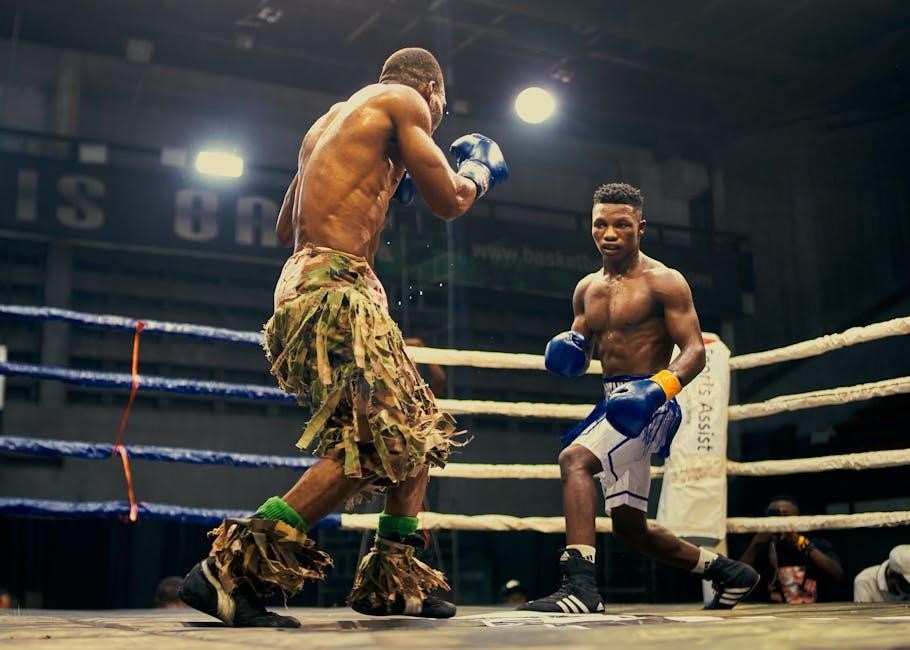Suzan-Lori Parks’ Pulitzer Prize-winning play, Topdog/Underdog, is a darkly comic fable exploring sibling rivalry, identity, and societal struggles through the lives of brothers Lincoln and Booth.
Overview of the Play
Topdog/Underdog by Suzan-Lori Parks is a darkly comic fable that delves into themes of identity, sibling rivalry, and societal struggles. The play centers on two brothers, Lincoln and Booth, whose names reflect a lifelong joke turned bitter reality. Their complex relationship is marked by a constant power struggle, as they navigate personal ambitions and shared hardships. The play’s two-character dynamic creates an intimate yet intense exploration of brotherly love, survival, and the weight of history. A PDF version of the play is widely available for readers to explore its poetic and rhythmic storytelling.
Historical Context and Pulitzer Prize

Topdog/Underdog earned Suzan-Lori Parks the Pulitzer Prize for Drama in 2002, marking a historic milestone as the first African American woman to achieve this honor. The play resonates with themes of identity, class, and systemic inequality, reflecting the broader societal struggles of its time. Its exploration of brotherly love and familial conflict, intertwined with poetic language, solidified its place in contemporary theatre. The Pulitzer win highlighted its cultural impact and enduring relevance in exploring the African American experience. A PDF version captures this seminal work for readers worldwide.
Major Themes in “Topdog/Underdog”
The play delves into identity crises, sibling rivalry, and class conflict, exploring themes of fate, family, jealousy, and societal struggles through the brothers’ complex relationship and ambitions.
Identity Crisis and Sibling Rivalry
Lincoln and Booth, named as a cruel joke, embody the struggle of identity and sibling rivalry. Their lifelong competition, rooted in resentment and ambition, reflects their inner turmoil. Lincoln, the topdog, clings to stability, while Booth, the underdog, seeks validation. Their dynamic, marked by jealousy and tension, explores how societal expectations and personal aspirations shape their fractured bond. This duality highlights their constant battle for dominance and self-worth, mirroring broader existential conflicts.
Class Conflict and Societal Struggles
Topdog/Underdog delves into the brothers’ struggles with poverty and systemic inequality. Lincoln and Booth’s lives are shaped by economic disparities, reflecting broader societal issues. Their shared room, devoid of stability, mirrors the precariousness of their existence. The play critiques how class structures trap individuals in cycles of hardship. Through their experiences, Parks highlights the resilience and desperation born from marginalization, offering a poignant commentary on the societal forces that constrain opportunity and perpetuate inequality. Their story underscores the human cost of economic struggle.
Fate, Family, and Jealousy
Topdog/Underdog explores themes of fate, family, and jealousy through the brothers’ intertwined lives. Their names, Lincoln and Booth, foreshadow a tragic rivalry, echoing historical destiny. Family dynamics are fraught with tension, as their shared past shapes their present. Jealousy festers between them, driven by perceived successes and failures; Booth’s resentment of Lincoln’s former glory propels the narrative, while Lincoln’s struggle to escape his fate mirrors their collective entrapment. The play examines how familial bonds, marked by love and rivalry, are both a source of strength and a catalyst for destruction.

Play Structure and Style
Topdog/Underdog features a stripped-down, two-character structure, with poetic and rhythmic language that blends humor and drama, creating a layered exploration of identity and conflict.
Darkly Comic Fable and Poetic Language
Topdog/Underdog is a darkly comic fable that intertwines brotherly love with sharp societal critique. Suzan-Lori Parks’ rhythmic, poetic language creates a vivid atmosphere, blending humor and tension. The play’s dialogue, rich in African American Vernacular English, adds depth to the characters’ struggles. This unique linguistic style, combined with its fable-like structure, highlights themes of identity and conflict, making the narrative both haunting and thought-provoking. The poetic elements elevate the story, offering a fresh perspective on sibling rivalry and survival.

Two-Character Dynamics: Lincoln and Booth
At the heart of Topdog/Underdog are the complex dynamics between brothers Lincoln and Booth, whose names reflect a lifelong joke foretelling their rivalry. Lincoln, the “topdog,” and Booth, the “underdog,” navigate power struggles, identity crises, and shared history. Their interactions are raw and charged, blending humor with tension. Through their exchanges, Parks explores themes of sibling resentment, ambition, and survival, making their relationship both compelling and deeply human. The brothers’ interplay drives the play’s emotional core, revealing their intertwined fates.

Availability of “Topdog/Underdog” in PDF
The Topdog/Underdog script by Suzan-Lori Parks is available as a free PDF download, offering a 117-page TCG Edition for easy access to this powerful play.
Free Download Options and File Details
Topdog/Underdog by Suzan-Lori Parks is available as a free PDF download, with the TCG Edition offering 117 pages in English. The file size is approximately 24 MB, making it easily accessible. Various platforms provide this play, ensuring readers can explore its themes of sibling rivalry and identity crisis. PDF downloads allow users to engage with Parks’ poetic language and the brothers’ compelling storylines. This format ensures the play’s accessibility for both academic and personal reading purposes.
Accessing the Play Through Online Platforms
The play Topdog/Underdog can be accessed through various online platforms, offering both digital scripts and live performance streaming options. Platforms like 4th Wall Theatres and Filament Theatre provide digital access, while sites like Windy City Playhouse and Actors Express offer e-ticket purchases for live shows. Performance schedules, such as those through 10/20 or 3/31, are readily available online, ensuring audiences can plan their viewing experiences. This accessibility allows global engagement with Parks’ powerful exploration of sibling dynamics and societal themes.

Performance History and Reviews
Topdog/Underdog premiered on Broadway in 2002 at the Ambassador Theatre, earning critical acclaim and a Pulitzer Prize. Its 2022 revival, starring Corey Hawkins and Yahya Abdul-Mateen II, received rave reviews for its raw intensity and emotional depth, solidifying the play’s reputation as a masterpiece of contemporary theatre.
Broadway Production and Revivals
Topdog/Underdog premiered on Broadway at the Ambassador Theatre in 2002, earning a Pulitzer Prize. Its 2022 revival, starring Corey Hawkins and Yahya Abdul-Mateen II, brought renewed acclaim. The production captivated audiences with its raw intensity and emotional depth, showcasing the timeless themes of sibling rivalry and identity. Directed by Kenny Leon, the play’s minimalist set and powerful dialogue highlighted the brothers’ struggles. This revival solidified the play’s legacy as a masterpiece of contemporary American theatre, resonating deeply with modern audiences.
Critical Acclaim and Audience Reception
Topdog/Underdog has garnered widespread critical acclaim for its raw emotional power and nuanced dialogue. Audiences have praised the play’s ability to balance humor with heartbreak, creating a deeply affecting theatrical experience. The 2022 Broadway revival, featuring standout performances by Corey Hawkins and Yahya Abdul-Mateen II, was particularly celebrated, with critics highlighting the actors’ chemistry and the production’s minimalist yet impactful staging. The play’s exploration of sibling rivalry and identity continues to resonate powerfully with both critics and audiences alike.

Psychological Concepts in the Play
The play explores psychological duality through the “topdog” and “underdog” concept, reflecting internal conflict and power struggles, influenced by Frederick Perls’ theories on human behavior and identity.

Topdog and Underdog: A Psychological Duality
The characters Lincoln and Booth embody the psychological duality of “topdog” and “underdog.” This concept, inspired by Frederick Perls, symbolizes the internal struggle between the dominant, confident aspect (topdog) and the submissive, vulnerable side (underdog). The brothers’ interactions reveal a constant power dynamic, with Lincoln often asserting control and Booth striving to overcome his inferiority. This duality mirrors broader societal conflicts, where individuals grapple with self-perception and external expectations, highlighting the universal human struggle for balance and self-acceptance.
Frederick Perls’ Influence on Character Development
Suzan-Lori Parks drew inspiration from Frederick Perls’ psychological concepts of “topdog” and “underdog” to craft the complex characters of Lincoln and Booth. Perls’ theory explores the internal conflict between the dominant, critical “topdog” and the submissive, vulnerable “underdog.” This duality is mirrored in the brothers’ relationship, where Lincoln embodies confidence and control, while Booth struggles with insecurity and ambition. Perls’ ideas enriched the play’s exploration of identity, power dynamics, and the internal battles that shape human behavior, adding depth to the characters’ psychological journeys.

Cultural and Academic Significance
Topdog/Underdog is a contemporary masterpiece influencing modern theatre with its exploration of fate, family, and societal struggles. Its poetic language and themes make it a staple in academic curricula, shaping American drama and fostering critical discussions on identity and class conflict. The play’s availability in PDF has expanded its reach, ensuring its enduring impact on both theatrical performance and educational settings.
Impact on Contemporary Theatre
Suzan-Lori Parks’ Pulitzer Prize-winning play Topdog/Underdog has significantly influenced contemporary theatre by redefining dramatic storytelling. Its exploration of sibling rivalry, identity, and societal struggles resonates deeply with modern audiences. The play’s two-character dynamic, rich poetic language, and darkly comic tone have set a new standard for theatrical expression. The availability of the play in PDF format has made it accessible for both academic study and theatrical productions, further cementing its impact on American drama and ensuring its continued relevance in today’s theatre landscape.
Use in Educational Settings
Topdog/Underdog is widely used in educational settings due to its rich thematic depth and poetic language. The PDF version of the play, curated by scholars like Dr; Zach Dailey, provides students with a comprehensive resource for analyzing themes of identity, class conflict, and sibling rivalry. Its inclusion in academic curricula has made it a cornerstone for teaching contemporary theatre, enabling students to explore complex societal issues through a dramatic lens. The play’s accessibility in PDF format facilitates deeper engagement and study.
Topdog/Underdog remains a vital exploration of identity, family, and societal struggles, offering enduring relevance through its darkly comic narrative and psychological depth, cementing its place in contemporary theatre.
Enduring Relevance of “Topdog/Underdog”

Suzan-Lori Parks’ Topdog/Underdog continues to resonate with audiences due to its universal themes of sibling rivalry, identity, and societal struggles. The play’s exploration of brotherly love and family dynamics, intertwined with historical and psychological elements, ensures its relevance in modern theatre. Its darkly comic tone and poetic language make it a timeless piece, attracting both academic and cultural interest. The availability of the play in PDF format has further expanded its accessibility, ensuring its enduring impact on contemporary theatre and education.
